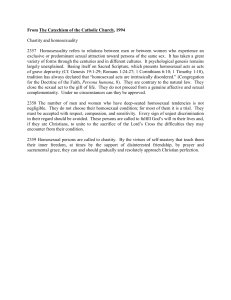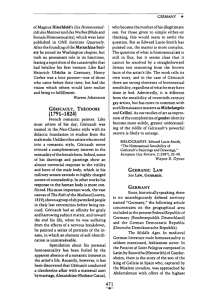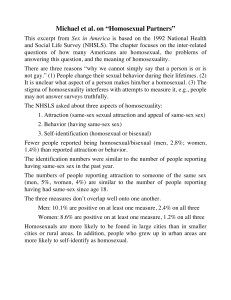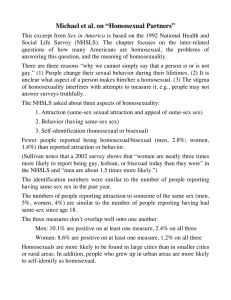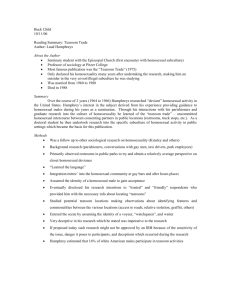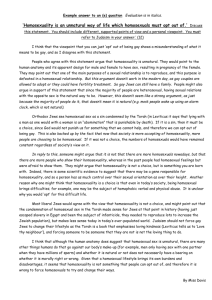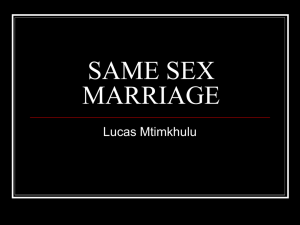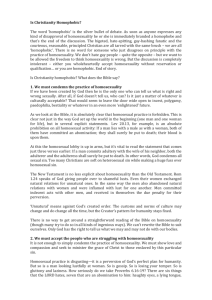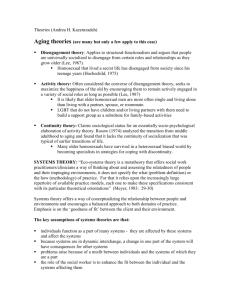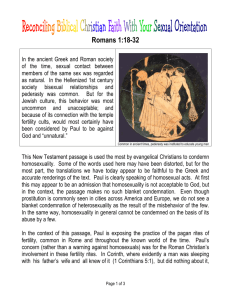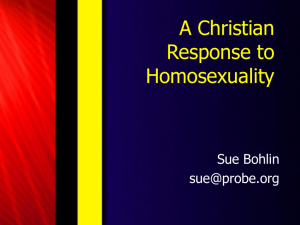the big three - homosexuality, abortion & euthanasia
advertisement
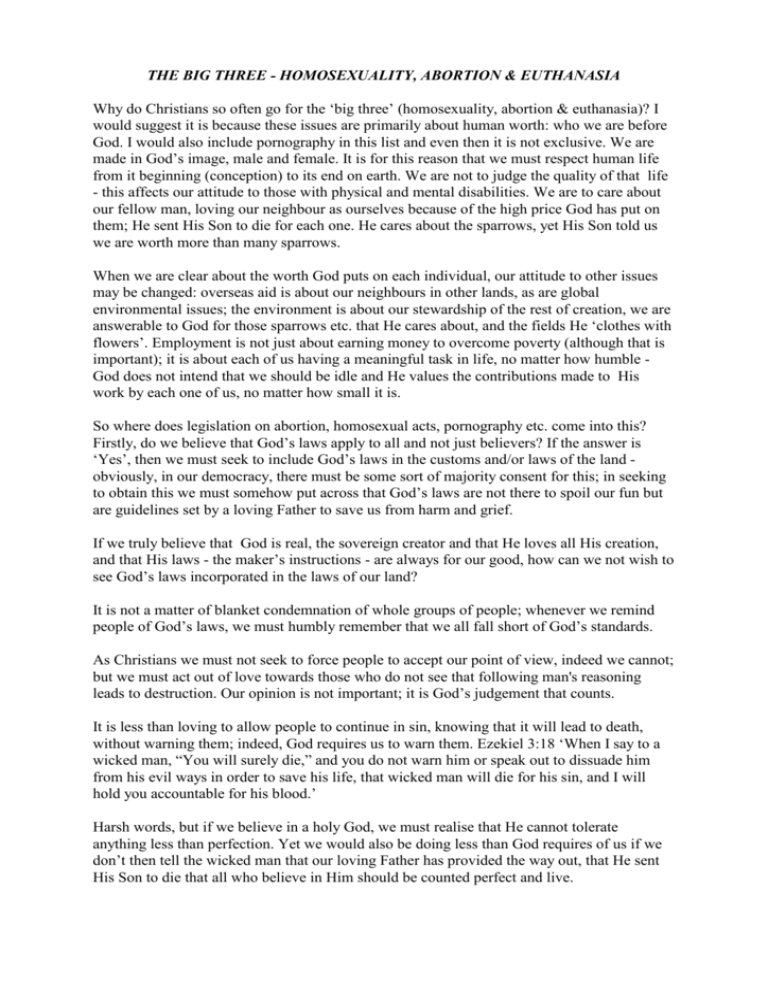
THE BIG THREE - HOMOSEXUALITY, ABORTION & EUTHANASIA Why do Christians so often go for the ‘big three’ (homosexuality, abortion & euthanasia)? I would suggest it is because these issues are primarily about human worth: who we are before God. I would also include pornography in this list and even then it is not exclusive. We are made in God’s image, male and female. It is for this reason that we must respect human life from it beginning (conception) to its end on earth. We are not to judge the quality of that life - this affects our attitude to those with physical and mental disabilities. We are to care about our fellow man, loving our neighbour as ourselves because of the high price God has put on them; He sent His Son to die for each one. He cares about the sparrows, yet His Son told us we are worth more than many sparrows. When we are clear about the worth God puts on each individual, our attitude to other issues may be changed: overseas aid is about our neighbours in other lands, as are global environmental issues; the environment is about our stewardship of the rest of creation, we are answerable to God for those sparrows etc. that He cares about, and the fields He ‘clothes with flowers’. Employment is not just about earning money to overcome poverty (although that is important); it is about each of us having a meaningful task in life, no matter how humble God does not intend that we should be idle and He values the contributions made to His work by each one of us, no matter how small it is. So where does legislation on abortion, homosexual acts, pornography etc. come into this? Firstly, do we believe that God’s laws apply to all and not just believers? If the answer is ‘Yes’, then we must seek to include God’s laws in the customs and/or laws of the land obviously, in our democracy, there must be some sort of majority consent for this; in seeking to obtain this we must somehow put across that God’s laws are not there to spoil our fun but are guidelines set by a loving Father to save us from harm and grief. If we truly believe that God is real, the sovereign creator and that He loves all His creation, and that His laws - the maker’s instructions - are always for our good, how can we not wish to see God’s laws incorporated in the laws of our land? It is not a matter of blanket condemnation of whole groups of people; whenever we remind people of God’s laws, we must humbly remember that we all fall short of God’s standards. As Christians we must not seek to force people to accept our point of view, indeed we cannot; but we must act out of love towards those who do not see that following man's reasoning leads to destruction. Our opinion is not important; it is God’s judgement that counts. It is less than loving to allow people to continue in sin, knowing that it will lead to death, without warning them; indeed, God requires us to warn them. Ezekiel 3:18 ‘When I say to a wicked man, “You will surely die,” and you do not warn him or speak out to dissuade him from his evil ways in order to save his life, that wicked man will die for his sin, and I will hold you accountable for his blood.’ Harsh words, but if we believe in a holy God, we must realise that He cannot tolerate anything less than perfection. Yet we would also be doing less than God requires of us if we don’t then tell the wicked man that our loving Father has provided the way out, that He sent His Son to die that all who believe in Him should be counted perfect and live. THE BIG THREE - HOMOSEXUALITY, ABORTION & EUTHANASIA 2 This brings me to the specific points I would like to make about homosexuality in reply to Jeremy Barker’s letter (‘Christian Focus’ Summer 1992). Firstly I would like to state that this is written out of love, as one saved sinner to another. I don’t think God counts homosexual acts as ‘bigger’ sins that others; Revelation 22:15 puts sexual immorality with murder, idolatry, the occult and lying - most of us if we were honest would come within that list! Secondly I would like to make a distinction between homosexual inclinations and homosexual practices, the latter being the area of sin. However, I do not believe that God intends for any of His children to be homosexual, He wants them whole and for their sexuality to be expressed (if at all) within a faithful, monogamous, heterosexual marriage. Further discussion of this point is outside the scope of this article; suffice to say that I have had problems with my own heterosexuality and have been ‘healed/delivered’ (whatever term you may feel appropriate) and know that God has no favourites. What He has done for me He can and will do for others. Considering the Lib Dem manifesto, I would wholeheartedly support moves to fight victimisation of homosexuals but would be unhappy at allowing promotion of homosexuality as an acceptable life-style; in the same way as I would not like to see fornication and adultery put forward as acceptable. This is particularly important in the delicate area of sex education where adolescents are working through their own attitudes to their sexuality. This brings me to the age of consent. It is illogical that we have several different ages of maturity and it would seem ‘fair’ to have one age of consent for sexual acts. However, I do not think that at 16 one can be sure that one’s sexual orientation has been fixed; nor do I believe that homosexual orientation cannot be changed. Furthermore, I would suggest that 16 is too young for heterosexuals - we can see that from the number of failed teenage marriages but it would be a long haul to try to change the law on that. The aim of the law on the age of consent is to protect the young: 16-21 is an age when we are unlikely to have the emotional maturity to decide on a matter which would put us outside of mainstream society (a fact, which is likely to remain whatever the legislation). For a full and reasoned treatment of this I would recommend the briefing paper ‘Homosexual rights - the issues examined’ produced by CARE (Christian Action Research and Education) and available from them at 53 Romney Street, London SW1P 3RF. I offer these thoughts to help further the debate on these issues. But never let us forget that the bottom line is, what does God think? Published in ‘Christian Focus’ February 1993 2
